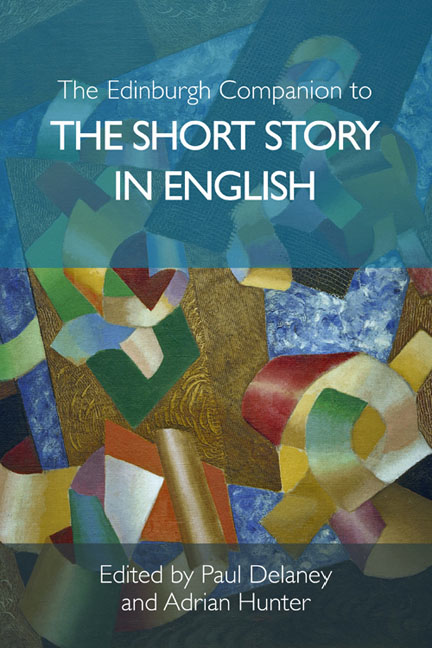Book contents
- Frontmatter
- Contents
- Acknowledgements
- Notes on Contributors
- Introduction
- Part I Historicising the Short Story
- 1 Transnationalism and the Transatlantic Short Story
- 2 The Short Story and the Professionalisation of English Studies
- 3 Impressionism and the Short Story
- 4 Writers on the Short Story: 1950–present
- Part II Publishing the Short Story
- Part III Forms of the Short Story
- Part IV Placing the Short Story
- Part V Identity and the Short Story
- Index of Short Story Titles
- General Index
2 - The Short Story and the Professionalisation of English Studies
from Part I - Historicising the Short Story
Published online by Cambridge University Press: 18 December 2019
- Frontmatter
- Contents
- Acknowledgements
- Notes on Contributors
- Introduction
- Part I Historicising the Short Story
- 1 Transnationalism and the Transatlantic Short Story
- 2 The Short Story and the Professionalisation of English Studies
- 3 Impressionism and the Short Story
- 4 Writers on the Short Story: 1950–present
- Part II Publishing the Short Story
- Part III Forms of the Short Story
- Part IV Placing the Short Story
- Part V Identity and the Short Story
- Index of Short Story Titles
- General Index
Summary
IN HIS LANDMARK STUDY OF Romantic short fiction, Tim Killick notes a tendency among scholars to read ‘backwards’ from Hawthorne and Poe, treating the decades prior to the 1840s as, at best, preparatory to the emergence of the short story as a modern literary form. The result, Killick argues, is a historical and geographical bias that neglects the polygenetic array of ‘innovative modes and sub-genres’ of shorter fiction flourishing on both sides of the Atlantic during the preceding half century. Much subsequent scholarship has taken Killick's cue, prising open the hitherto neglected history of Romantic-period short fiction. From Ian Duncan's account of short-form ‘nonnovelistic experimentation’ in the British miscellany, to Amanpal Garcha's exploration of the 1830s sketch as a radical form calibrated to the ‘newness, disconnection, and detachment’ of urban life, our understanding of the short story's beginnings has shifted backward in time, and outward in kind to embrace all manner of brief fictional texts.
Alongside this new historicist work has run a corresponding effort to overturn what Michael Collins identifies as the dominant nationalist-formalist paradigm in short story criticism. The persistence of that paradigm – which owes much to the writings of Charles E. May, Susan Lohafer and the so-called ‘new’ short story criticism of the 1980s and 1990s – has had the effect not only of distorting the historical record but of perpetuating a fundamentally Americentric view of the form. Collins's own solution is to reconfigure the early nineteenth-century short story as a phenomenon of transatlantic and transnational literary exchange. Timothy Clark goes further still, arguing for the abandonment of reading practices that inherently privilege ‘specific characteristics’ and ‘inherent properties’ conventionally associated with founding American practitioners of the short story. Clark singles out in this connection a critical over-reliance on visual analogies, ‘countervailing metaphors of sight, of the striving to “see” a text whole, the flash of revelation, etc’ – a conceptual apparatus that has its roots in Poe's ‘unity of impression’ and the notion of the short story as a ‘totality’ readily visualisable in the way the novel is not (‘a picture is at length painted which leaves in the mind of him who contemplates it with a kindred art, a sense of the fullest satisfaction’, as Poe would have it). Thus do ‘accounts of the short story per se’ proceed on the assumption, Clark says, that the form is ‘fundamentally “American” in some sense’.
- Type
- Chapter
- Information
- The Edinburgh Companion to the Short Story in English , pp. 24 - 39Publisher: Edinburgh University PressPrint publication year: 2018



